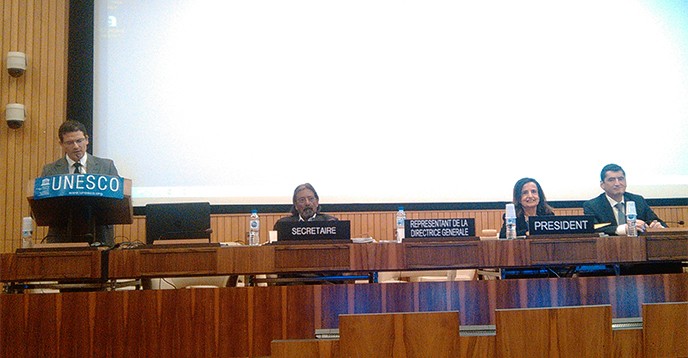news_250618_ifap_council.jpg

Representatives of 26 Member States of the Intergovernmental Council of the Information for All Programme (IFAP) gathered at UNESCO Headquarters in Paris on 20 and 21 June 2018, for the Council’s 10th session. Member States were elected to the IFAP Council in November 2017 by UNESCO’s General Conference, and were accompanied by observers from Member States, intergovernmental bodies and non-governmental organizations that have official status with UNESCO.
In his opening remarks, the newly appointed Assistant Director-General for CI, Mr. Moez Chakchouk commended IFAP’s members and partners for their substantial efforts and significant achievements.
“Important work has been done across the six priorities of the Programme,” said Mr Chakchouk. “In particular, I would like to highlight IFAP’s activities to prevent the radicalization of youth leading to violent extremism. This work, initiated by IFAP in June 2015 with the organization of the international conference “Youth and the Internet: Fighting Radicalization and Extremism”, was a launching pad for UNESCO’s global framework of action: Empowering Youth to Build Peace.
While recognizing its achievements, Mr Chakchouk also pointed to the challenges facing IFAP, notably related to its sustainability and funding.
He called for the “full support and active engagement of the Council” to enable IFAP to attain its ambitious goals and for “members to continue contributing to IFAP activities by supporting fundraising efforts, actively promoting and further developing IFAP national committees, and participating in working groups.”
The Council is responsible for guiding the planning and the implementation of IFAP and used the 2-day session to review its achievements and discuss the strategic orientations for the Programme during the 2017-2021 period. Particular attention was given to further improving IFAP's working modalities, financial situation and visibility, as well positioning IFAP’s actions within the context of the SDG.
On the first day, the Council elected its Members to the Bureau for a term of two years. Following two successful mandates of Ms Chafica Haddad, Deputy Permanent Delegate of Grenada to UNESCO, the Council elected Ms Dorothy Gordon, from Ghana, as its Chair and Chair of the IFAP Bureau.
Also elected to the Bureau were the Netherlands, Oman and the Russian Federation as Vice-Chairs, with Hungary, Malaysia and Peru as Members and Egypt as the Rapporteur.
The Bureau is the operational body of the Council and is expected to play a key role in implementing the recommendations adopted by the IFAP Council, leading the Working Groups constituted to address IFAP's strategic priority areas, provide support to the National IFAP Committees in their respective regions, and promote visibility and resource mobilization for IFAP.
The Intergovernmental Information for All Programme was established in 2001. It provides a platform for international policy discussions, cooperation and the development of guidelines for action in the area of access to information and knowledge. The Programme supports Member States to develop and implement national information policy and strategy frameworks in the areas of information accessibility, information for development, information ethics, information literacy, information preservation and multilingualism.
